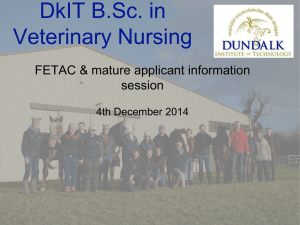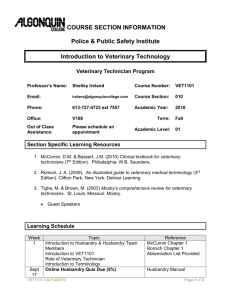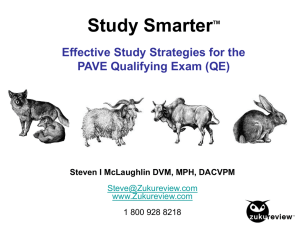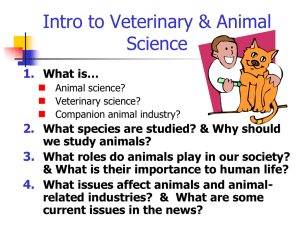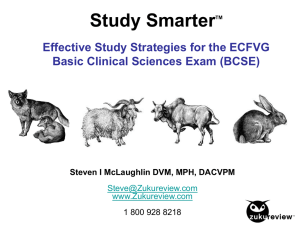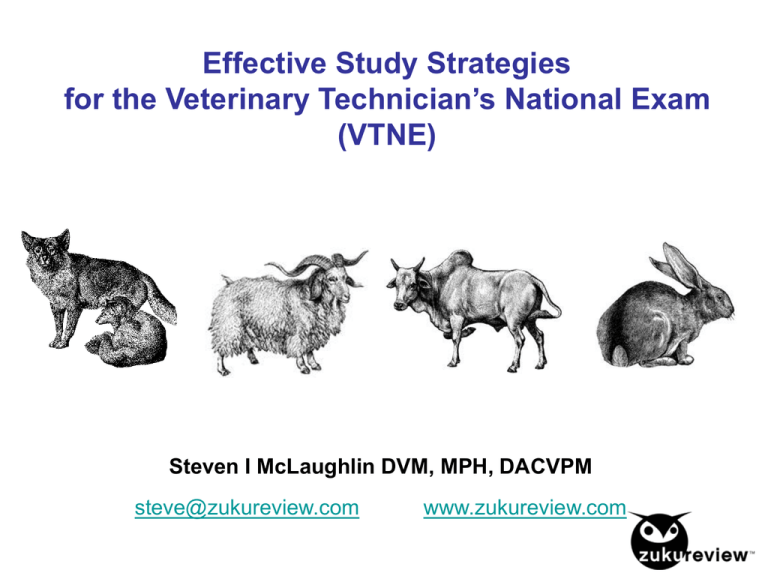
Effective Study Strategies
for the Veterinary Technician’s National Exam
(VTNE)
Steven I McLaughlin DVM, MPH, DACVPM
steve@zukureview.com
www.zukureview.com
A Story
Once upon a time, there was a world called veterinary medicine,
covered in many forests.
One forest was called “Dogs”; another “Pigs” and so on.
In the Dog forest, there were many trees. One tree might be called
“Radiology” and another called “Anesthesia”.
On that anesthesia tree might be a single leaf called “isoflurane”
One day, a good-hearted but near-sighted student wandered into
the Dog forest, and got so engrossed studying a leaf on a single tree
that she got lost, and a big bad wolf called VTNE came and ate her.
The End
The need for speed
It is time to go fast, people.
• The goal is not to know everything
• The goal is not to get every question right
• The goal is to pass
In the forests of knowledge, let this be your map
The 3 most effective things
you can do
• Do practice questions that are as much
like the real VTNE® as possible (~50%)
• Study notes, books with images (~50%)
• Leave 2-3 weeks free before VTNE to
RE-do test-mode tests and review notes
This presentation
• VTNE Structure
• Test-taking strategies
• Study Strategies (hitting the books)
VTNE Structure
• 170 Multiple choice questions
• 3 hour test
– About 1 minute per question
• 20 questions are “pilot” items
– Not scored
– Cannot tell which questions are “pilot”
– Being evaluated for use in future VTNE exams
• The clock doesn’t stop once you begin your test
– Can take short breaks, but clock is still ticking
Source: VTNE Candidate Bulletin http://www.aavsb.org/VTNE/CandidateHandbook/
VTNE Practice Domains
•
•
•
•
•
•
•
•
•
Domain 1. Pharmacy & Pharmacology
~18 Qs (12%)
Domain 2. Surgical Nursing
~17 Qs (11%)
Domain 3. Dentistry
~10 Qs (7%)
Domain 4. Laboratory Procedures
~18 Qs (12%)
Domain 5. Animal Care and Nursing
~33 Qs (22%)
Domain 6. Diagnostic Imaging
~10 Qs (7%)
Domain 7. Anesthesia
~24 Qs (16%)
Domain 8. Emergency Medicine/Critical Care ~10 Qs (6%)
Domain 9. Pain Management/Analgesia
~10 Qs (7%)
150 Qs* (100%)
*Remember: There are actually 170 questions total, but 20 “pilot” questions don’t count.
You won’t know which ones are the pilot questions.
Source: VTNE Candidate Bulletin http://www.aavsb.org/VTNE/CandidateHandbook/
Worth Remembering on Test Day
• Must show up 30 minutes early
– Must have Authorization to Test (ATT) letter w/ unique i.d. number
– Must have identification
• Photo-i.d. with name (ie: driver’s license, passport, military i.d.)
• Name on i.d must match ATT name
• i.d. must not be expired
• No personal belongings allowed in test room
– No calculator, cell phone or digital watch
– No food or drink
– No backpack, brimmed hats, purse or coat
• What is allowed ?
– Erasable whiteboard provided for calculations
– Some people bring earplugs
Source: VTNE Candidate Bulletin http://www.aavsb.org/VTNE/CandidateHandbook/
Study Smarter
• Start with a calendar
– Map out your study plan, week by week
– Make test prep part of your routine
• 1st Pass: from now through July 5
– All study-mode tests
– Make or study summary notes with IMAGES!
• 2nd Pass: last 2-3 weeks before VTNE®
– RE-DO all questions in timed test-mode
– Review summary notes, books
VTNE Prep: Top 3 Useful Tools
1. Get one good book
Clinical Textbook for Veterinary Technicians, McCurnin and Bassert 8th edition
2. Do practice questions regularly
•
Workbook for Clinical Textbook for Vet Techs, 8th ed., McCurnin and Bassert’s
•
Zuku Review
•
•
•
Question of the Day http://zukureview.com/vtne/qod
VTNE course http://zukureview.com/vtne/subscriptions/
AAVSB self assessments for VTNE http://aavsb.ucertify.com/
3. Tune up with a good review
VSPN VTNE Review
•
•
•
A live, online class with practice questions, notes and a forum.
Taught 3X/year by experienced and highly credentialed technicians.
Comprehensive and very well done. http://www.vin.com/CE/TECH120-0913_VSPN.htm
Prep strategies for VTNE
The 50:50 rule
Practice testing ~50%
Study ~50%
-ROUTINE
4-6 days a week
-Hit the books
-Write summary notes
-REVIEW those NOTES
Goal: Finish practice testing, complete notes
2-3 weeks before the test
“It is not enough to be a good chess player,
you must also play well.”
-Savielly Tartakower
Practice testing for VTNE:
~50% of your time
“You don't get ready for a marathon by
reading a book about it.
You put on your running shoes and run.”
-Dr. Zuku
Multiple choice tricks of the trade
• The Good News
Correct answer is GUARANTEED to be among the choices
• The Bad News
You WILL hit questions you don’t know
Common mistake: Spending MOST of your time on
questions about which you know the LEAST.
• Key to success:
Train yourself to MAKE CHOICES and then MOVE ON.
Multiple choice tricks of the trade
• READ the question first (DON’T look at answers)
• PREDICT the answer
(protects you from distractors)
• Is your answer the best of the choices ?
If “Yes” SELECT it and move on
• Unsure of the correct answer ?
ELIMINATE wrong ones, choose from what’s left,
and MOVE ON
“What if I don’t think this system will work for me ?”
Do what works for you.
“How do I know when I should I change an answer ?”
Stick with your first answer unless you recognize that it
is clearly not correct - studies show that changed answers
are more frequently wrong.
“I am clueless about chickens/cardiology/box turtle
halitosis, what do I do?”
Read, Predict, Eliminate, Select -The correct answer is
guaranteed to be among the choices. Whittle the
choices down to as few as possible and guess.
Sources of practice questions
1.
Books
•
Workbook for Clinical Textbook for Vet Techs, 8th ed., McCurnin and Bassert’s
•
Mosby’s Comprehensive Review for Vet Techs, 3rd ed., Tighe & Brown
•
Review Questions and Answers for Vet Techs, 4th ed., Colville
2.
Online
•
VSPN VTNE review course: 8 weeks http://beta.vin.com/CE/CatalogVSPN.htm
Winter 2014 TECH120-0114 (Starts each January)
Spring 2014 TECH120-0514 (Starts each May)
Fall
2014 TECH120-0914 (Starts each September)
•
Zuku Review VTNE practice tests: http://zukureview.com/vtne/subscriptions/
•
•
Question of the Day (free) http://zukureview.com/vtne/qod
AAVSB self assessments for VTNE
http://www.testrac.com/aavsb/
VTNE self assessments
A good way to prepare for VTNE
• Produced by same people who write the VTNE
• Two tests available
• $45 each, 75 questions each
• After test, look up answers to ones you didn’t know
• Orients you to VTNE-question style, depth
Link: American Association of Veterinary State Boards (AAVSB) self-assessment
https://www.aavsb.org/vtne/howtostudy
http://aavsb.ucertify.com/
“To achieve great things,
two things are needed;
a plan, and not quite enough time.”
- Leonard Bernstein
Hitting the books for VTNE:
~50% of your time
“Successful learning is not measured by how
many hours you study.
Successful learning means using the hours
you do have effectively.”
-Dr. Zuku
(Steven I Mclaughlin DVM, MPH, DACVPM)
A study technique that
doesn’t work
“I spent 6 hours reading pharmacology
on Saturday,…..
But Monday, I didn’t remember any of it !”
“Reading = Learning”
USE IT OR LOSE IT
• MOST adults forget 50% of what they just read
• And 80% within 24 hours
BUT !!
• Anything you have studied well will come back
very quickly with a review
….if you make good notes
Summary Notes (and hitting the books)
~1/3 of your time
• Why review visual summary notes? (and good visual books)
– Faster, more effective than wading through pages of text
– Images are like “mental duct tape”
– Information sticks to them
• Visual summary notes worth their weight in gold in weeks before test
Mental velcro: Images
A picture IS worth a thousand words:
Add pictures to your notes
Fluid-filled lungs: Pulmonary edema
“Floating lungs”: Pleural effusion
Images courtesy of Dr. Terri Defrancesco, DVM, DACVIM
All rights reserved, copyright 2013
Mental velcro: Disease
Horner’s Syndrome:
Remember "My 3rd Sunken Toe“
(Miosis, 3rd lid protrudes, Sunken
eye, Ptosis)
A syndrome, not a disease per se.
See 4 things with Horner's, ALL
associated with the eye:
1. MIOSIS (constricted pupil)
2. PROTRUSION 3rd eyelid
3. ENOPTHALMOS (sunken eye)
4. PTOSIS (drooped eyelid),
What is it?
Image courtesy,
Dr. Joel Mills, Wikimedia Commons
http://commons.wikimedia.org/wiki/File:Horner%
27s_syndrome_dog.JPG
Outside a dog, a book is a man’s best friend.
Inside a dog, it’s too dark to read.
- Groucho Marx
If you believe everything you read, better not read.
- Japanese proverb
Good Books for VTNE
For overall review
* Clinical Textbook for Veterinary Technicians, 8th ed, McCurnin & Bassert
If you can have only one book, this is the one. Covers everything, Great images.
Anesthesia, dentistry, surgery, nursing, imaging, calculations-its all there
* VSPN Notebook version 4.0
Practical, clinical and constantly updated online. An excellent clinic and VTNE resource.
Available online to VSPN and VIN members as part of membership.
http://www.vin.com/Members/CMS/misc/Current.aspx?id=6096&pid=49&catid=&said=2
Available to VSPN and VIN members in print form
https://store.vin.com/custom/edit.asp?p=100020
Mosby’s Comprehensive Review for Veterinary Technicians, 3rd ed., Tighe & Brown
Outline format is a little dry (few pictures), but lots of multiple choice questions after each chapter, and a long
practice test at the end.
Pharmacology:
Plumb’s Veterinary Drug Handbook, 7th edition, Donald C. Plumb
Also available online to VSPN and VIN members as part of membership.
For background on medicine and diseases
These may be too clinical for VTNE, but have excellent disease summaries and images
Bovine: Guide to Bovine Clinics 4th edition—Chris & Susan Pasquini
Equine: Guide to Equine Clinics 3rd edition—Chris & Susan Pasquini, Phil Woods
Dogs and Cats: Tschauner's Guide to Small Animal Clinics 2nd ed.—Chris & Susan Pasquini
Veterinary Clinical Advisor, Dogs and Cats, 1st ed. Cote' ed.
*Pick of the Litter
The final 2-3 weeks
Second Pass
Practice testing
Timed test-mode- redoing Qs you
did in last few months to reinforce
-One minute per question
-60 Qs at a time to build stamina
-Random topics
-No answers as you go
-Try to mimic the real thing
Study
-REVIEW your notes
-Skim misc. topics not in notes
-Test yourself with flashcards,
friends, game cards
Goal: Redo your practice questions of last few months
Review summary notes until solid in your mind
The final 2-3 weeks: Keep a routine
• Get regular exercise
…Run, swim, square-dance, walk your dog, hamster or wombat
• Get up at about same time you need to wake up on test day
• Eat breakfast
• Go immediately into 1-2 hours of practice tests, then notes review
• Get your mind & body into a routine so the big day feels routine too
• Don't give up.
• Watch this video: Building confidence before a challenge- Excellent TED talk.
http://www.ted.com/talks/amy_cuddy_your_body_language_shapes_who_you_are.html
• On test day, walk in with your head held high,
and take it one question at a time
Good luck!
“No student knows his or her subject:
the most he knows is where and how to find out the
things he does not know.”
–Woodrow Wilson
Selected references:
Psychology of learning and decision-making
Good summaries
“To Really Learn, Quit Studying and Take a Test”, New York Times, Jan 20, 2011, P. Belluck
http://www.nytimes.com/2011/01/21/science/21memory.html
Do You Suffer From Decision Fatigue?” New York Times, Aug 17, 2011, J. Tierney
http://www.nytimes.com/2011/08/21/magazine/do-you-suffer-from-decision-fatigue.html?hpw
Peer-reviewed
Karpicke, J. D., & Blunt, J. R. (2011). Retrieval practice produces more learning than
elaborative studying with concept mapping. Science, 331, 772-775.
http://www.sciencemag.org/content/331/6018/772.full.pdf?keytype=ref&siteid=sci&ijkey=mESdLR0p25r8k
Roediger, H. L., & Karpicke, J. D. (2006). Test-enhanced learning: Taking memory tests
improves long-term retention. Psychological Science, 17, 249-255.
http://memory.psych.purdue.edu/downloads/2006_Roediger_Karpicke_PsychSci.pdf
Roediger, H. L. & Karpicke, J. D. (2006). The power of testing memory: Basic research and
implications for educational practice. Perspectives on Psychological Science, 1, 181-210.
http://memory.psych.purdue.edu/downloads/2006_Roediger_Karpicke_Review.pdf
Carrier and Pashler: The Influence of Retrieval on Retention, Memory and Cognition, 1992,
20 (6) 633-642 http://laplab.ucsd.edu/articles/Carrier_Pashler_MemCog1992.pdf
References
The summary of multiple choice strategies comes principally from:
“What Smart Students Know” by Adam Robinson, co-founder of The Princeton Review test
preparation company
George Washington University Academic Success Center- “Strategies for Multiple Choice
Questions”
Kaplan Test Prep US Medical Licensure Exam (USMLE) Strategy Sessions
VTNE Candidate Bulletin http://www.aavsb.org/VTNE/CandidateHandbook/
Example of a page from Pasquini
From: Pasquini, Pasquini & Woods, Guide to Equine Clinics, 3rd ed. p. 113


